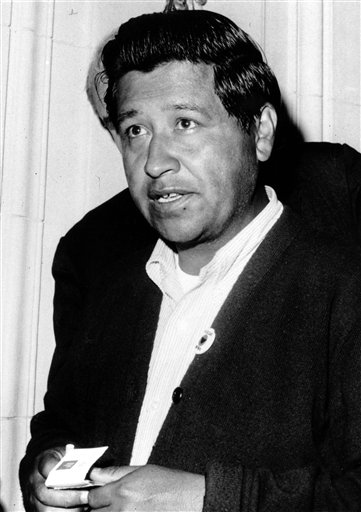

This April 18, 1966 file photo shows Cesar Chavez, leader of the National Farm Workers Association, speaking to the press in San Francisco, Calif. A California Republican congressman on Tuesday May 17, 2011 lambasted the Navy for naming a cargo ship after the late farmworker activist a decision the lawmaker criticized as being unfair to military war heroes. (AP Photo, File)
California Republican congressman Duncan Hunter is criticizing the Navy for naming a cargo ship after farmworker activist Cesar Chavez, saying that it is unfair to military war heroes.
“Naming a ship after Cesar Chavez goes right along with other recent decisions by the Navy that appear to be more about making a political statement that upholding the Navy’s history and tradition,” Hunter, a member of the House Armed Services Committee, said. Last week he criticized the Navy for a decision that would have allowed chaplains to perform same-sex marriages in states where it was legal. The Navy quickly reversed its policy.
The ship, the last of the 14 Lewis and Clark-class cargo ships, is being built in San Diego’s Barrio Logan by General Dynamic NASSCO. The majority of Barrio Logan’s population is Hispanic. A NASSCO spokesman said that the company suggested the name because it wanted to honor its mostly Hispanic workforce and the area.
Chavez joined the army in 1946 and was honorably discharged two years later.
Hunter, a former Marine who served in Iraq and Afghanistan, said that he feels a better choice would be Marine Corps Sgt. Rafael Peralta, a Medal of Honor nominee who died in Iraq, or John Finn, a World War II Medal of Honor recipient and lifelong San Diego resident.
“If this decision were about recognizing the Hispanic community’s contribution to our nation, many other names come to mind,” said Hunter, a former Marine who served in Iraq and Afghanistan.
Other lawmakers like Sen. Barbara Boxer, D-Calif, are praising the decision.
“I applauded Secretary Mabus for continuing the Navy’s rich tradition of naming these supply ships after pioneers, explorers and visionaries by honoring Cesar Chavez, who worked tirelessly to promote fair working conditions and equal rights for all Americans,” she said. ”
Chavez is known for his work in ending discriminatory practices against the Hispanic population. He led nationwide grape boycotts and mobilized tens of thousands of migrant workers, which forced growers to respect labor rights and sign union contracts.
He received death threats and was called a Communist during his lifetime. Some farmers still believe that he hurt California’s agricultural industry.
Chavez died in 1993 at the age of 66. In 1994 President Bill Clinton awarded him the U.S. Medal of Freedom, the highest civilian honor.
With Associated Press



